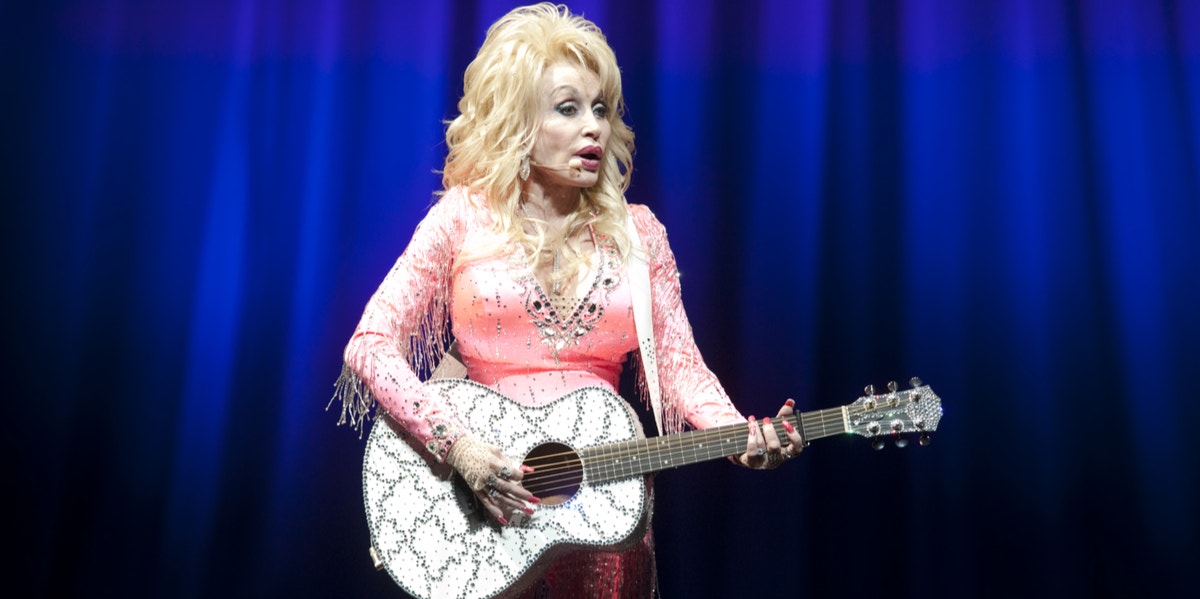The Quickest Way To Boost Your Child In A Competitive World, According To Dolly Parton
Trust me: your child will love you for this.
 Jack Fordyce / Shutterstock
Jack Fordyce / Shutterstock Kids who first visit our house always say the same thing:
‘You live in a library!’
We don’t, but we love reading.
Heaving bookshelves embrace our walls, and books pile up beside our beds. Lucky for our kids, reading is not simply a life-enriching hobby. It will likely give them enduring benefits, something Dolly Parton knows all about.
Are books beneficial for kids growing up?
Access to books in the home can positively influence your child’s academic success. Why? Because reading will give your child an expansive vocabulary and deliver them a pathway to more knowledge.
But in a world beset with inequality, access to books for kids is never straightforward.
How economic disadvantage affects a child’s literacy
Research suggests children of disadvantaged backgrounds have less exposure to the written word, with parents of children from a higher economic, social status (high SES) reading 1,000 hours to them before their kids start kindergarten. In contrast, average children of a low SES only receive 25 hours of storytime in that time.
There are many reasons for this discrepancy, with the most obvious one: not enough books in low-income areas. One study shows that in middle-income neighborhoods, one child has access to 13 children’s books, compared to her peers in a low-income area who share one with 299 others.
A 20-year long study demonstrates the difference between being raised in a bookless home and being brought up in a house with a 500-book library is associated with extending the child’s education by 3.2 years.
But even for us, 500 books sounds like a sizeable amount. However, Evans, the lead researcher, and professor of sociology at, University of Nevada, argues that having only 20 books will make a difference. And the more books you add, the higher the benefits. She says, “You get a lot of ‘bang for your book. It’s quite a good return-on-investment in a time of scarce resources.”
This is something Dolly Parton knows all about.
Her Imagination Library, piloted in Tennessee, sends out one book per month to each registered child until they reach five. The books (addressed to each child with a personal message) have encouraged countless parents to read more to their offspring.
Since its launch in 1995, it has gifted 160 million books to kids across Australia, Canada, the United States, the Republic of Ireland, and the United Kingdom. In the US, it puts books into the tiny hands of nearly seven percent of the nations under five.
Any child can apply, regardless of financial background, provided there is a local sponsor.
Dolly’s inspiration
Growing up as one of twelve in rural Appalachia, money was scarce. Her intelligent father couldn’t read or write, and as a child, Dolly witnessed how this impacted his entire life. She wondered, “God, if he’d had an education, I wonder what all he might’ve been?”
And if you’re wondering why Parton, who hasn’t raised children, has devoted herself to children’s literacy, her quote in a 2018 interview is enlightening.
“Now that I’m older, I realize I didn’t have kids of my own, so everybody’s kids could be mine.”
Knowing that literacy gives children lifelong benefits, she told NPR, " “If you can read, even if you can’t afford education, you can go on and learn about anything you want to know. There’s a book on everything.”
Dolly Parton isn’t the only celebrity improving children’s literacy.
The inspirational Marcus Rashford has launched a book club for kids in partnership with the publisher MacMillan to ‘promote reading and literacy among children from all backgrounds.’
Aiming to reach over 300,000 UK children who don’t have books, he says, "I just wish I was offered the opportunity to really engage with reading more as a child, but books were never a thing we could budget for as a family when we needed to put food on the table."
"There were times where the escapism of reading could have really helped me. I want this escapism for all children. Not just those that can afford it.”
Both Parton and Rashford agree selected books should be developmentally appropriate and diverse, so all children can relate, regardless of gender, race, location, or religion.
How can you encourage your children to read?
Start reading to them when they’re babies, and don’t stop when they’re older.
Build up a collection of children's books; do what I did and visit charity shops for books on a budget.
- Visit your local library together.
- Read books, not your phone, in their presence; show them you enjoy reading.
- Give back: donate books you are no longer using to charities or second-hand shops.
We know books are beneficial for children, and having books in a home library is associated with extending the child’s education by 3.2 years.
However, in an unequal society, access to books is a privilege. This is a painful fact Parton and Rashford are only too aware of, coming from underprivileged families. Both are now putting books into children’s hands — allowing them to read their way into a better life.
We can learn from them by encouraging our children to fall in love with reading, whether by buying secondhand books, as we do, or borrowing them from the library.
Either way, reading will give children a flying start to their future.
Christine Vann writes about parenting, society, and Cyberpsychology. Follow her on Medium, or visit Bumpsnbeyond.com.

